| Listing 1 - 9 of 9 |
Sort by
|
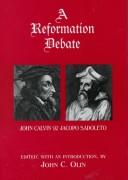
ISBN: 0823219917 9780823219919 0823219909 9780823219902 Year: 1999 Publisher: New York: Fordham university press,
Abstract | Keywords | Export | Availability | Bookmark
 Loading...
Loading...Choose an application
- Reference Manager
- EndNote
- RefWorks (Direct export to RefWorks)
Reformation --- Church --- Justification (Christian theology)
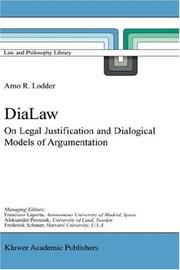
ISBN: 0792358309 Year: 1999 Publisher: Dordrecht : Kluwer academic,
Abstract | Keywords | Export | Availability | Bookmark
 Loading...
Loading...Choose an application
- Reference Manager
- EndNote
- RefWorks (Direct export to RefWorks)
Justification (Law). --- Law --- Logic. --- Philosophy.
Book
ISBN: 9021170183 Year: 1999 Publisher: Zoetermeer Meinema
Abstract | Keywords | Export | Availability | Bookmark
 Loading...
Loading...Choose an application
- Reference Manager
- EndNote
- RefWorks (Direct export to RefWorks)
This study llinks up new developments in sacramentology with the worldwide ecumenical debates on the theology of creation, justification and freedom. (9)
Creation --- Freedom (Theology) --- Justification (Christian theology) --- Sacraments and Christian union --- Theology, Doctrinal --- 231.51 --- Christian union and sacraments --- Christian union --- 231.51 De Deo creatore. Schepping --- De Deo creatore. Schepping --- Faith and justification --- Justification --- Justification by faith --- Salvation --- Biblical cosmogony --- Cosmogony --- Natural theology --- Teleology --- Beginning --- Biblical cosmology --- Creation windows --- Creationism --- Evolution --- History of doctrines --- History --- Christianity --- Christian dogmatics --- Ecclesiology --- Sacraments
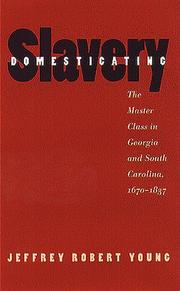
ISBN: 0807876186 9780807876183 0807824909 9780807824900 0807847763 9780807847763 9798890871251 Year: 1999 Publisher: Chapel Hill London
Abstract | Keywords | Export | Availability | Bookmark
 Loading...
Loading...Choose an application
- Reference Manager
- EndNote
- RefWorks (Direct export to RefWorks)
In this carefully crafted work, Jeffrey Young illuminates southern slaveholders' strange and tragic path toward a defiantly sectional mentality. Drawing on a wealth of archival evidence and integrating political, religious, economic, and literary sources, he chronicles the growth of a slaveowning culture that cast the southern planter in the role of benevolent Christian steward--even as slaveholders were brutally exploiting their slaves for maximum fiscal gain.Domesticating Slavery offers a surprising answer to the long-standing question about slaveholders' relationship with the proliferating capitalistic markets of early-nineteenth-century America. Whereas previous scholars have depicted southern planters either as efficient businessmen who embraced market economics or as paternalists whose ideals placed them at odds with the industrializing capitalist society in the North, Young instead demonstrates how capitalism and paternalism acted together in unexpected ways to shape slaveholders' identity as a ruling elite. Beginning with slaveowners' responses to British imperialism in the colonial period and ending with the sectional crises of the 1830s, he traces the rise of a self-consciously southern master class in the Deep South and the attendant growth of political tensions that would eventually shatter the union.
Slaveholders --- Slavery --- Plantation life --- Regions & Countries - Americas --- History & Archaeology --- United States - General --- Country life --- Abolition of slavery --- Antislavery --- Enslavement --- Mui tsai --- Ownership of slaves --- Servitude --- Slave keeping --- Slave system --- Slaveholding --- Thralldom --- Crimes against humanity --- Serfdom --- Slaves --- Slave holders --- Slave masters --- Slave owners --- Slavemasters --- Slaveowners --- Persons --- Plantation owners --- Attitudes --- History. --- Justification. --- History --- Justification --- Georgia --- South Carolina --- Politics and government --- Enslaved persons --- Enslavers --- African Americans --- Social Science
Book
ISBN: 3451021803 9783451021800 Year: 1999 Volume: 180 Publisher: Freiburg Herder
Abstract | Keywords | Export | Availability | Bookmark
 Loading...
Loading...Choose an application
- Reference Manager
- EndNote
- RefWorks (Direct export to RefWorks)
Ecclesiology --- Justification (Christian theology) --- Biblical teaching. --- 28*082.3 --- 234.121 --- -#GOSA:I.NT.Alg.M --- #GOSA:I.OT.Alg.M --- #GOSA:I.NT.Pa.M --- #GOSA:III.Oec.M --- #GGSB: Dogmatiek --- #GGSB: Schepping --- Oecumenische discussies tussen katholieken en protestanten --- Rechtvaardiging. Dispositie voor de rechtvaardiging. Geloof alleen volstaat niet --- Biblical teaching --- 234.121 Rechtvaardiging. Dispositie voor de rechtvaardiging. Geloof alleen volstaat niet --- 28*082.3 Oecumenische discussies tussen katholieken en protestanten --- #GOSA:I.NT.Alg.M --- Bible. --- Epistles of Paul --- Paul, Epistles of --- Paul Sŏsin --- Pauline epistles --- Risālat al-Qiddīs Būlus al-rasūl al-thāniyah ilá Tīmūthīʼūs --- Theology. --- Dogmatiek --- Schepping --- Justification (Christian theology) - Biblical teaching.
Book
ISBN: 3897100924 9783897100923 Year: 1999 Volume: 70 Publisher: Paderborn Bonifatius
Abstract | Keywords | Export | Availability | Bookmark
 Loading...
Loading...Choose an application
- Reference Manager
- EndNote
- RefWorks (Direct export to RefWorks)
Christian fundamental theology --- Ecclesiology --- Anglican Communion --- Justification (Christian theology) --- Revelation --- Relations --- Catholic Church. --- History of doctrines. --- Christianity --- 234.121 --- 28*082.2 --- 231.74 --- -Justification (Christian theology) --- -God --- God --- Inspiration --- Supernatural --- Rechtvaardiging. Dispositie voor de rechtvaardiging. Geloof alleen volstaat niet --- Oecumenische discussies tussen katholieken en anglicanen --- Openbaring --- History of doctrines --- Anglican/Roman Catholic International Commission --- Catholic Church --- -Church of Rome --- Roman Catholic Church --- Katholische Kirche --- Katolyt︠s︡ʹka t︠s︡erkva --- Römisch-Katholische Kirche --- Römische Kirche --- Ecclesia Catholica --- Eglise catholique --- Eglise catholique-romaine --- Katolicheskai︠a︡ t︠s︡erkovʹ --- Chiesa cattolica --- Iglesia Católica --- Kościół Katolicki --- Katolicki Kościół --- Kościół Rzymskokatolicki --- Nihon Katorikku Kyōkai --- Katholikē Ekklēsia --- Gereja Katolik --- Kenesiyah ha-Ḳatolit --- Kanisa Katoliki --- כנסיה הקתולית --- כנסייה הקתולית --- 가톨릭교 --- 천주교 --- Church of England. --- ARCIC --- A.R.C.I.C. --- Commission internationale anglicane-catholique romaine --- Commission internationale de dialogue entre anglicans et catholiques --- Anglican/Roman Catholic Joint Preparatory Commission --- -Anglican Communion --- -Rechtvaardiging. Dispositie voor de rechtvaardiging. Geloof alleen volstaat niet --- -Relations --- 231.74 Openbaring --- 28*082.2 Oecumenische discussies tussen katholieken en anglicanen --- 234.121 Rechtvaardiging. Dispositie voor de rechtvaardiging. Geloof alleen volstaat niet --- -231.74 Openbaring --- -ARCIC --- Christian sects --- Relations&delete& --- Christianity&delete& --- Anglican/Roman Catholic International Commission. --- Anglican Communion. --- Anglican-Roman Catholic International Commission. --- Church of Rome --- Anglican Communion - Relations - Catholic Church. --- Justification (Christian theology) - History of doctrines. --- Revelation - Christianity - History of doctrines.
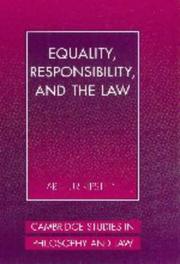
ISBN: 0521584523 0521003075 1316046206 0511609159 9780521584524 9780511609152 9780521003070 Year: 1999 Publisher: Cambridge Cambridge University press
Abstract | Keywords | Export | Availability | Bookmark
 Loading...
Loading...Choose an application
- Reference Manager
- EndNote
- RefWorks (Direct export to RefWorks)
This book examines responsibility and luck as these issues arise in tort law, criminal law, and distributive justice. The central question is: whose bad luck is a particular piece of misfortune? Arthur Ripstein argues that there is a general set of principles to be found that clarifies responsibility in those cases where luck is most obviously an issue: accidents, mistakes, emergencies, and failed attempts at crime. In revealing how the problems that arise in tort and criminal law as well as distributive justice invite structurally parallel solutions, the author also shows the deep connection between individual responsibility and social equality. This is a challenging and provocative book that will be of special interest to moral and political philosophers, legal theorists, and political scientists.
Accident law. --- Criminal attempt. --- Distributive justice. --- Liability (Law). --- Mistake (Law). --- Necessity (Law). --- Mistake (Law) --- Necessity (Law) --- Criminal attempt --- State of necessity --- Duress (Law) --- Justification (Law) --- Self-defense (Law) --- Self-help (Law) --- Error (Law) --- Consent (Law) --- Ignorance (Law) --- Motive (Law) --- Attempt, Criminal --- Criminal act --- Inchoate offenses --- Preparation (Criminal law) --- Law, Accident --- Liability (Law) --- Accident law --- Distributive justice --- Accountability --- Legal responsibility --- Responsibility, Legal --- Responsibility (Law) --- Accidents --- Injuries (Law) --- Law and legislation --- Assistance in emergencies --- Criminal liability --- Declaration of intention --- Fraud --- Good faith (Law) --- Civil law --- Contracts --- Obligations (Law) --- Distribution (Economic theory) --- Justice --- Social justice --- Wealth --- Negligence --- Personal injuries --- Torts --- Moral and ethical aspects --- Arts and Humanities --- Philosophy
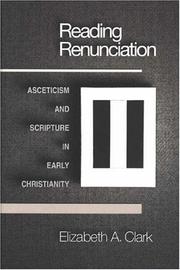
ISBN: 0691005117 0691005125 1400823188 1282753770 9786612753770 1400811244 9781400823185 1400801230 9780691005126 1400801222 Year: 1999 Publisher: Princeton (N.J.): Princeton university press
Abstract | Keywords | Export | Availability | Bookmark
 Loading...
Loading...Choose an application
- Reference Manager
- EndNote
- RefWorks (Direct export to RefWorks)
A study of how asceticism was promoted through Biblical interpretation, Reading Renunciation uses contemporary literary theory to unravel the writing strategies of the early Christian authors. Not a general discussion of early Christian teachings on celibacy and marriage, the book is a close examination, in the author's words, of how "the Fathers' axiology of abstinence informed their interpretation of Scriptural texts and incited the production of ascetic meaning." Elizabeth Clark begins with a survey of scholarship concerning early Christian asceticism that is designed to orient the nonspecialist. Section Two is organized around potentially troubling issues posed by Old Testament texts that demanded skillful handling by ascetically inclined Christian exegetes. The third section, "Reading Paul," focuses on the hermeneutical problems raised by I Corinthians 7, and the Deutero-Pauline and Pastoral Epistles. Elizabeth Clark's remarkable work will be of interest to scholars of late antiquity, religion, literary theory, and history.
248 "00/04" --- Asceticism --- -Ascetical theology --- Contempt of the world --- Theology, Ascetical --- Christian life --- Ethics --- Spiritualiteit. Ascese. Mystiek. Vroomheid--?"00/04" --- History --- -Asceticism --- Bible --- Criticism, interpretation, etc. --- Biblia --- Asceticism - History - Early church, ca 30-600 --- Acts of Paul and Thecla. --- Acts of Thomas. --- Adultery. --- Allegory. --- Ambrosiaster. --- Anchorite. --- Apologetics. --- Apostasy. --- Arianism. --- Asceticism. --- Basil of Ancyra. --- Basil of Caesarea. --- Bible. --- Body of Christ. --- Book of Judges. --- Book of Wisdom. --- Celibacy. --- Chastity. --- Christian Order. --- Christianity. --- Church Fathers. --- Clement of Alexandria. --- Clerical celibacy. --- Concupiscence. --- Consummation. --- Contra Celsum. --- Conversion to Christianity. --- Criticism of marriage. --- De fide. --- Dialogue with Trypho. --- Dispensation (canon law). --- Docetism. --- Donatism. --- Elijah. --- Epistle to the Ephesians. --- Evagrius Ponticus. --- Exegesis. --- Ezekiel. --- Fear of God. --- First Epistle to the Corinthians. --- Fornication. --- Gluttony. --- God. --- Helvidius. --- Heresy. --- Heterodoxy. --- Holiness code. --- Idolatry. --- Incest. --- Incorruptibility. --- Indulgence. --- Infidel. --- Jews. --- John Cassian. --- John Chrysostom. --- Jovinian. --- Judaizers. --- Justification (theology). --- Justin Martyr. --- Lactantius. --- Manichaeism. --- Marcion of Sinope. --- Marcionism. --- Matthew 25. --- Melania the Elder. --- Midrash. --- Monasticism. --- Montanism. --- New Testament. --- Old Testament. --- Origen. --- Paganism. --- Parable of the Great Banquet. --- Parable of the Ten Virgins. --- Paulinus of Nola. --- Pelagianism. --- Progressive revelation (Bahá'í). --- Rebuke. --- Religion. --- Religious text. --- Renunciation. --- Rule of Faith. --- Sacramentum (oath). --- Self-denial. --- Sexual Desire (book). --- Sexual abstinence. --- Sirach. --- Sola fide. --- Spiritual marriage. --- Spirituality. --- Spouse. --- Superiority (short story). --- Susanna (Book of Daniel). --- Tertullian. --- The City of God (book). --- Theodore of Mopsuestia. --- Theology. --- Thomas the Apostle. --- Thou shalt not commit adultery. --- Virginity.
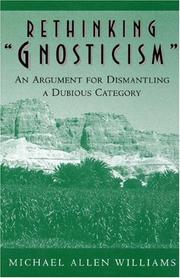
ISBN: 0691005427 0691011273 1400822211 1282753193 9786612753190 1400813832 9781400822218 1400808537 9780691011271 Year: 1999 Publisher: Princeton, NJ
Abstract | Keywords | Export | Availability | Bookmark
 Loading...
Loading...Choose an application
- Reference Manager
- EndNote
- RefWorks (Direct export to RefWorks)
Most anyone interested in such topics as creation mythology, Jungian theory, or the idea of "secret teachings" in ancient Judaism and Christianity has found "gnosticism" compelling. Yet the term "gnosticism," which often connotes a single rebellious movement against the prevailing religions of late antiquity, gives the false impression of a monolithic religious phenomenon. Here Michael Williams challenges the validity of the widely invoked category of ancient "gnosticism" and the ways it has been described. Presenting such famous writings and movements as the Apocryphon of John and Valentinian Christianity, Williams uncovers the similarities and differences among some major traditions widely categorized as gnostic. He provides an eloquent, systematic argument for a more accurate way to discuss these interpretive approaches. The modern construct "gnosticism" is not justified by any ancient self-definition, and many of the most commonly cited religious features that supposedly define gnosticism phenomenologically turn out to be questionable. Exploring the sample sets of "gnostic" teachings, Williams refutes generalizations concerning asceticism and libertinism, attitudes toward the body and the created world, and alleged features of protest, parasitism, and elitism. He sketches a fresh model for understanding ancient innovations on more "mainstream" Judaism and Christianity, a model that is informed by modern research on dynamics in new religious movements and is freed from the false stereotypes from which the category "gnosticism" has been constructed.
Gnosticism. --- Rome --- Religion. --- Gnosticism --- 273.1 --- 273.1 Gnosis. Gnosticisme --- Gnosis. Gnosticisme --- Religion --- Cults --- Rome - Religion --- Against the Galilaeans. --- Agrippa Castor. --- Anchorite. --- Anthropomorphism. --- Anti-Judaism. --- Antinomianism. --- Antipope. --- Apocalypse. --- Apocrypha. --- Apocryphon. --- Apostasy. --- Asceticism. --- Blasphemy. --- Borborites. --- Cainites. --- Catharism. --- Celibacy. --- Cerdo (gnostic). --- Cerinthus. --- Christian Identity. --- Christian fundamentalism. --- Christianity. --- Church Fathers. --- Clement of Alexandria. --- Consubstantiality. --- Contra Celsum. --- Creation myth. --- Demiurge. --- Demonization. --- Dialogue with Trypho. --- Divine Spark. --- Doctrine. --- Elohim. --- Epiphanes (gnostic). --- Epistle to the Laodiceans. --- Ernst Troeltsch. --- Exegesis. --- Exorcism. --- False prophet. --- God. --- Good and evil. --- Gospel of Eve. --- Gospel of Philip. --- Heresy of the Free Spirit. --- Heresy. --- Heterodoxy. --- Holy Book of the Great Invisible Spirit. --- Ideal type. --- Incorruptibility. --- Infidel. --- Irenaeus. --- Jews. --- Judaism. --- Judas Iscariot. --- Justification (theology). --- Justin Martyr. --- Manichaeism. --- Marcion of Sinope. --- Marcionism. --- Martyr. --- Metempsychosis. --- New religious movement. --- Nicolaism. --- Orthodox Judaism. --- Plotinus. --- Predestination. --- Problem of evil. --- Pseudo-Philo. --- Puritans. --- Pythagoreanism. --- Reform Judaism. --- Religious text. --- Renunciation. --- Sacred prostitution. --- Satan. --- Sect. --- Secularization. --- Self-denial. --- Sethianism. --- Sexual Desire (book). --- Sexual abstinence. --- Simon Magus. --- Skepticism. --- Sophia (Gnosticism). --- Spiritual marriage. --- Spirituality. --- Superiority (short story). --- Tertullian. --- The Other Hand. --- Theodicy. --- Theodotus of Byzantium. --- Theology. --- Thou shalt not commit adultery. --- Thou shalt not covet. --- Tractate. --- Wickedness. --- Writing. --- Zostrianos.
| Listing 1 - 9 of 9 |
Sort by
|

 Search
Search Feedback
Feedback About UniCat
About UniCat  Help
Help News
News